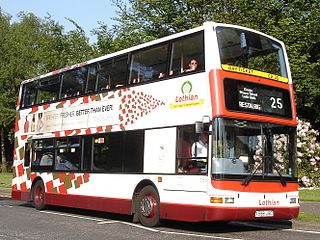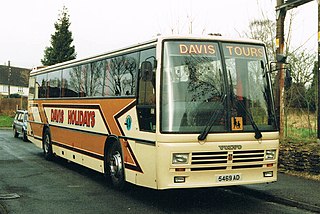Central Scottish Omnibuses Ltd was a bus operating subsidiary of the Scottish Transport Group formed in June 1985 from Central SMT, and operated until July 1989 when it was merged with Kelvin Scottish to form Kelvin Central Buses.
Plaxton is an English builder of bus and coach vehicle bodies based in Scarborough. Founded in 1907 by Frederick William Plaxton, it became a subsidiary of Alexander Dennis in May 2007. Since 2019, the maker was acquired by Canadian bus manufacturer New Flyer which then became NFI Group.

The Dennis Dart is a rear-engined single-decker midibus chassis that was introduced by Dennis Specialist Vehicles of Guildford, England in 1989, replacing the Dennis Domino. Initially built as a high-floor design, In 1996 the low-floor second generation Dennis Dart SLF was launched. In 2001, production of the Dart SLF passed to TransBus International, during which time it was sold as the TransBus Dart SLF; Alexander Dennis took over production in 2004, renaming the product as the Alexander Dennis Dart SLF.

The Volvo B7RLE is a low-entry single-deck bus chassis manufactured by Volvo. It was superseded by the Volvo B8RLE in 2013.

Duple Coachbuilders was a coach and bus bodybuilder in England from 1919 until 1989.

Duple Metsec was a bus bodywork builder based in West Midlands of England in the United Kingdom. It usually supplied body kits for bus assembly overseas.

The Volvo B10M is a mid-engined city bus and coach chassis manufactured by the Swedish automaker Volvo between 1978 and 2003. It succeeded the B58 and was equipped with the same 9.6-litre horizontally mounted Volvo diesel engine mounted under the floor behind the front axle. An articulated version under the model name Volvo B10MA was also offered, as was a semi-integral version known as the C10M, with the engine in the middle of the chassis.

Stagecoach Yorkshire is an operating division of Stagecoach Group.

The East Kent Road Car Company Ltd was a bus company formed in 1916 and based in Canterbury, Kent. The company operated bus and coach services in Kent. In 1993 it was one of the first companies to be acquired by the Stagecoach Group, which eventually rebranded the operation as Stagecoach in East Kent, and made it part of the Stagecoach South East bus division.

The Leyland Tiger, also known as the B43, was a mid-engined bus and coach chassis manufactured by Leyland between 1981 and 1992. This name had previously been used for a front-engined bus built between 1927 and 1968. It replaced the Leyland Leopard, which had been in production for over 20 years.

Barton Transport was a bus company that operated in Nottinghamshire from 1908 until 1989.

The Duple Dominant was a design of a coach bodywork built by Duple between 1972 and 1987. It introduced an all-steel structure and replaced the wooden-framed Duple Vega, Viceroy and Vista models.

The Northern Counties Palatine was a step-entrance 2-axle and 3-axle double-decker bus body built by Northern Counties from 1988 to 1999 in Wigan, England.

The Plaxton Centro was a low entry single-decker bus bodywork designed by Bluebird Vehicles and manufactured by Plaxton.

The Leyland Royal Tiger was a rear-engined coach chassis manufactured by Leyland between 1982 and 1987. It was intended to counter the offerings of foreign competitors such as the Jonckheere or Van Hool bodied DAF, Scania and Volvo touring coaches, but was not particularly successful, with only between 160 and 170 built.
Invictaway was an express commuter coach service from Kent to London in the 1980s and 1990s, and was also a holding company for the emerging Arriva group. As a legal entity of the Maidstone & District bus company, after the cessation of the Invictaway coach services, the Invictaway company legal lettering persisted as a holding company for the Arriva subsidiaries in Kent, and some London operations. This company was based in the Armstrong Road M&D depot in Maidstone. This ceased in 1997 when the operations were reconstituted as Arriva London and Arriva Southern Counties.

Lothian Buses Plc is the largest provider of bus services in and around Edinburgh, the capital city of Scotland. It is entirely municipally owned, being 91% owned by the City of Edinburgh Council, with the remainder owned by Midlothian, East Lothian and West Lothian councils, although it no longer provides bus services in West Lothian under the same name. Lothian Buses plc is registered in Annandale Street, Edinburgh as company number SC096849.
H. V. Burlingham was a British coachbuilding business based in Blackpool, Lancashire from 1928 until 1960 when they were taken over by London-based rivals Duple Motor Bodies. Duple initially renamed Burlingham as Duple (Northern) but in 1969 they closed their Hendon factory and concentrated production in Blackpool. Duple coach bodies were built in the former Burlingham premises until Duple itself was liquidated in 1989.

The Leyland Royal Tiger Worldmaster, sometimes simply known as the Leyland Worldmaster, was a mid-underfloor-engined single-decker bus or single-decker coach chassis manufactured by Leyland between 1954 and 1979.

The Duple 300 Series were a range of bus and coach bodywork built by Duple between 1985 and 1989. The range comprised the 3,000 mm high Duple 300 service bus, the 3,200 mm high Duple 320 coach, and the taller 3,400 mm high Duple 340 coach. The 320 and 340 coaches were announced at the Bus and Coach Show at Earls Court in September 1985 as replacements for the previous Laser and Caribbean. Deliveries of these models commenced in 1986, whilst the 300 bus was launched in 1987 as a replacement for the Dominant Bus. After Duple closed down the designs were sold to Plaxton and a small number of additional 320 bodies were built as the Plaxton 321.



















